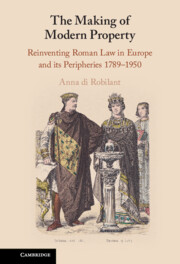Book contents
- The Making of Modern Property
- The Making of Modern Property
- Copyright page
- Dedication
- Contents
- Acknowledgments
- Introduction
- 1 What Roman Antiquity Had to Offer
- 2 The Foundations of Romanist-Bourgeois Property
- 3 Crafting Romanist-Bourgeois Property
- 4 Reform, Not Revolution
- 5 The Tensions of Absolute Property
- 6 Roman Dominium in the Republics of Latin America
- 7 The Social Critics
- Conclusions
- References
- Index
6 - Roman Dominium in the Republics of Latin America
Property, Nationhood, Race, and Economic Development
Published online by Cambridge University Press: 13 July 2023
- The Making of Modern Property
- The Making of Modern Property
- Copyright page
- Dedication
- Contents
- Acknowledgments
- Introduction
- 1 What Roman Antiquity Had to Offer
- 2 The Foundations of Romanist-Bourgeois Property
- 3 Crafting Romanist-Bourgeois Property
- 4 Reform, Not Revolution
- 5 The Tensions of Absolute Property
- 6 Roman Dominium in the Republics of Latin America
- 7 The Social Critics
- Conclusions
- References
- Index
Summary
This chapter charts the emergence of an anti-feudal disocurse of property modernization and the newly indpendent republics of Latin America. While the tones and the arguments of this anti-feudal discourse echoed the assault on feudal property in the metropole, the intellectual sources and the material interests of the detractors of feudalism in Latin America were far more complex. The liberal creole elites drew upon a vast and diverse political-economy literature that went beyond the obvious canonical authors of the French Enlightenment and included semi-peripheral regional traditions, such as the Neapolitan Enlightenment, that more closely resonated with their specific concerns about underdevelopment and metropolitan-satellite relations. Committed to agricultural improvement but also reluctant to undo the semi-feudal relations of production that allowed the landed elite to extract profit from the peasantry, jurists crafted a system that combined feudal property and modern dominium.
Keywords
- Type
- Chapter
- Information
- The Making of Modern PropertyReinventing Roman Law in Europe and its Peripheries 1789–1950, pp. 235 - 279Publisher: Cambridge University PressPrint publication year: 2023

